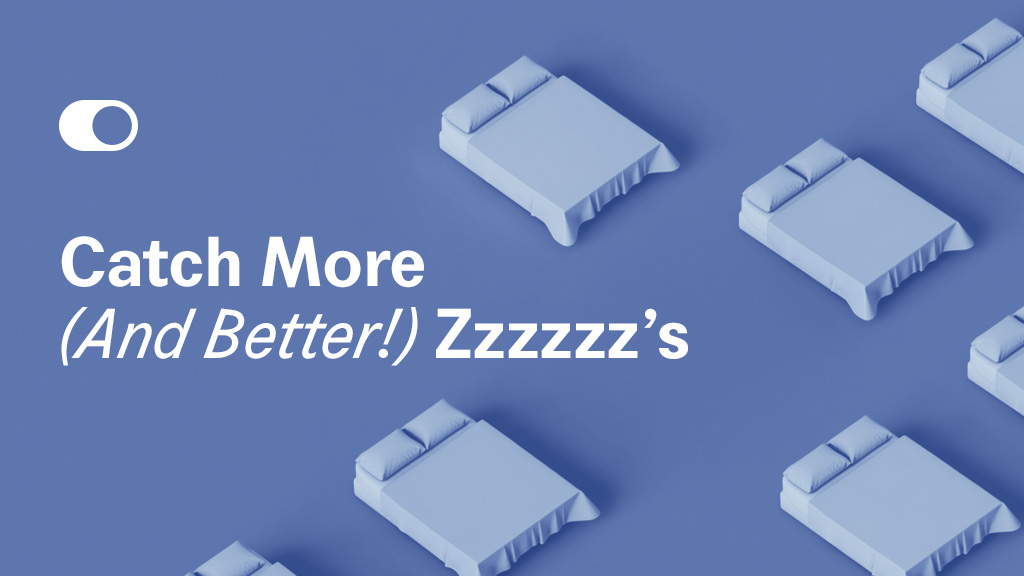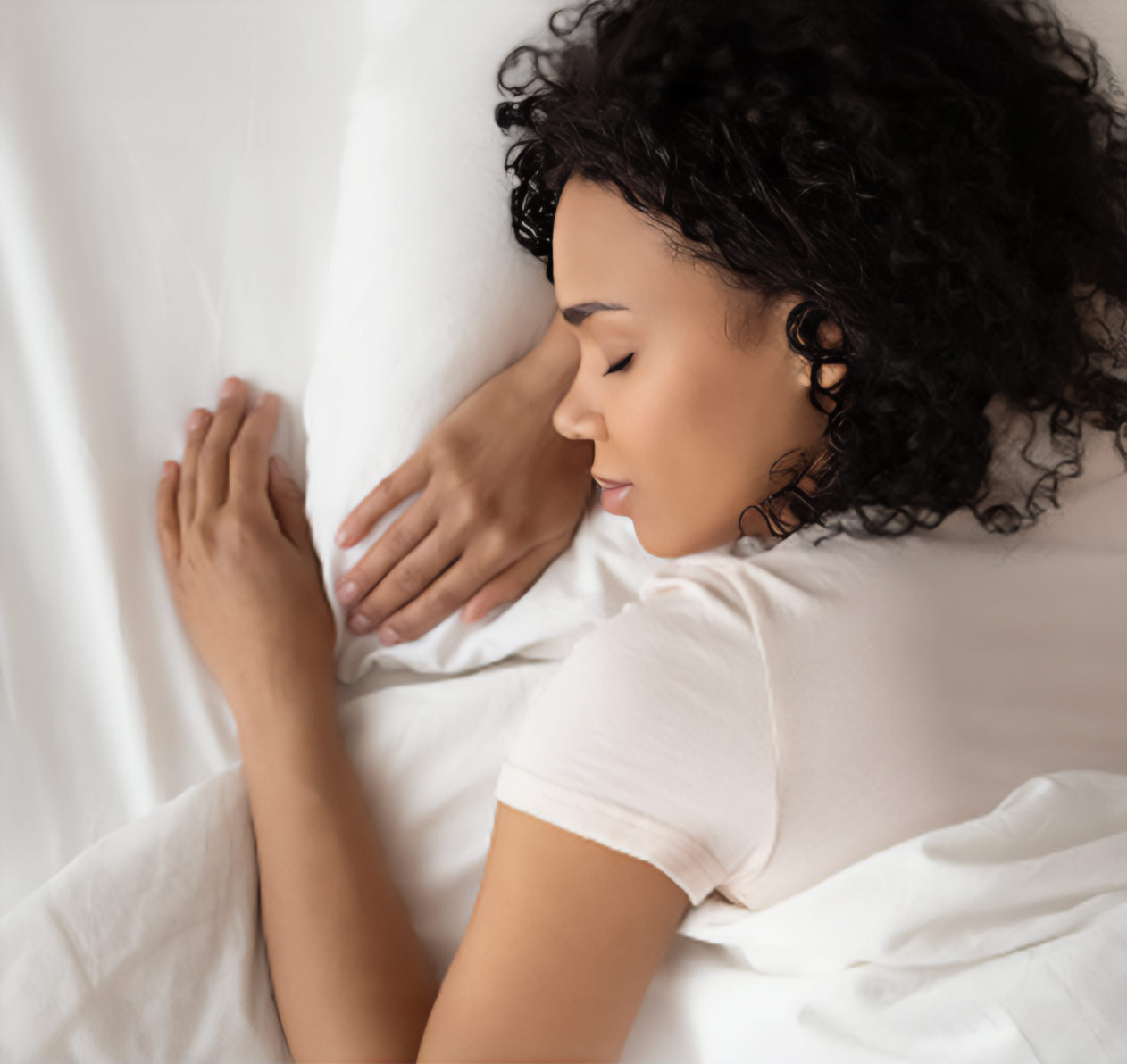
Catch More (And Better!) Zzzzzz’s
Why Sleep Matters
Quality sleep is a huge factor in overall physical and mental health. It’s just as essential for survival as food and water. But, sadly, sleep struggles are very common and have wide-ranging negative impacts on our day-to-day life, relationships, and health. If you’re looking to learn more about sleep and how to improve yours, we can help!

The Benefits of Sleep
In addition to feeling great, sleep has a ton of benefits for your mind and body that you may not be aware of. Sleep helps:
- Reset your body’s internal clock
- Improve longevity and slow down aging
- Improve your ability to think and problem-solve
- You learn and remember things
- Promote body tissue repair
- Restore energy and boost stamina
- Cleanse the brain of toxins
- Protect skin from the negative effects of sun exposure
- Fight disease
- Regulate metabolism and decrease sugar cravings
What Affects Sleep Quality
Lots of things can affect the quality of your sleep. Some people struggle to fall or stay asleep. Mental health struggles such as anxiety and depression can also make sleep challenging. Others are dealing with restless leg syndrome, teeth grinding, sleep apnea, or other health issues. And sometimes it just comes down to genetics and lifestyle or environmental factors like diet, exercise, stress, light, noise, or screen time.

The Effects of Poor Sleep
When you’re not sleeping well on a regular basis, you’ll feel less alert and may notice issues with general performance and health. That’s because anything less than seven hours of sleep most nights over several weeks will disrupt your brain and body’s normal functions and can lead to:

- Excessive daytime sleepiness/fatigue
- Frequent yawning
- Irritability
- Depression and anxiety
- Chronic pain
- Memory impairment and forgetfulness
- Poor concentration
- Low libido
Increased risk of early death due to:
- Cardiovascular disease
- Type 2 diabetes
- High blood pressure
- Weakened immune system
- Higher risk of accidents or falls
-
How To Catch More (And Better!) Zzzzzz’s
The best way to improve your quality of sleep and avoid the negative effects of sleep deprivation is to practice good sleep hygiene. You may also want to explore apps and wearable devices to help you monitor your sleep patterns and quality. A good sleep hygiene practice happens throughout your day and includes:
- Diet: Caffeine, alcohol, saturated fats, late-night eating, dehydration, and sugar can all affect your quality of sleep. Try to limit consumption, drink plenty of water, and avoid large meals before bedtime.
- Exercise: Regular exercise can help you manage stress and anxiety, as well as increase the amount of deep sleep you get.
- Stress Levels: Managing stress can be tough. Eating nutritious foods, exercising regularly, carving out me-time, and making to-do lists or simply writing down your thoughts can help clear your head and set you up for a restful sleep.
- A Wind Down Routine: Come up with a nightly routine that helps you calm down, relax, and get in the right mindset for sleep. Things like a warm bath, journaling, or reading can help.
- Temperature: A cool room is best. Ideally around 65F. You’ll also want to make sure PJs are made from breathable fabrics and have a variety of blankets nearby so you can adjust as needed for maximum comfort.
- Noise: Try to minimize noise as much as you can. Ear plugs and white noise machines can help if you don’t have as much control as you’d like.
- Light: Sunlight helps regulate your circadian rhythm so getting outside for at least a few minutes during the day is great. At home at night, try warm, dim lighting and keep your bedroom as dark as possible.
- Electronics: Avoiding too much screen time for 2-3 hours before bed can help you fall asleep faster and stay asleep longer. Using night mode if you can’t resist the urge to scroll can help.

It’s also important to make sure you get enough sleep. What’s enough? It’s recommended that adults get 7-9 hours of sleep a night, though the exact number needed varies from person to person.
If you have questions, connect with your Care Team.
Frequently Asked Questions
What is the connection between sleep and cognitive function, and how can optimizing sleep enhance mental performance?
Beyond just feeling more rested, high-quality sleep plays a crucial role in memory consolidation, problem-solving abilities, and overall brain health and productivity.
In what ways can poor sleep exacerbate or contribute to mental health conditions like depression and anxiety?
The bidirectional relationship between sleep disturbances and mood disorders is well-established, underscoring the importance of addressing both issues concurrently.
How can adjusting light exposure and circadian rhythms through techniques like light therapy help improve sleep quality?
Manipulating light cues at strategic times of day can have a profound impact on the body’s natural sleep-wake cycles and melatonin production.
What alternative therapies can enhance sleep quality?
Exploring modalities beyond just sleep hygiene and medication, such as herbal remedies, acupuncture, or mind-body practices, can offer additional pathways for improving sleep for certain individuals.
How do hormonal changes impact sleep across life stages?
Understanding the physiological factors influencing sleep during events like pregnancy, menopause, or andropause is crucial for developing appropriate interventions to manage sleep problems.
How does sleep affect child and adolescent development?
Insufficient or poor-quality sleep during formative years can have far-reaching consequences on growth, academic performance, and overall health, underscoring the importance of establishing healthy sleep habits early on.